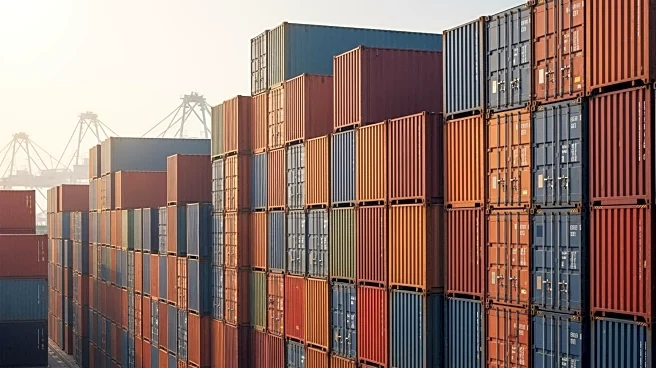What's Happening?
The container tracking market is anticipated to grow significantly, reaching a valuation of $14.63 billion by 2029. This growth is driven by several factors, including the surge in global trade and globalization,
increased focus on fleet optimization, and advancements in infrastructure. The Business Research Company attributes this expansion to a compound annual growth rate of 7.8%. Key trends expected to influence the market include the expanded use of blockchain technology, advanced data analytics, self-operating vehicles, and drones. Additionally, the market is seeing a consolidation with supply chain platforms and a heightened focus on environmental sustainability. The rise in cargo theft, exacerbated by economic pressures, is also contributing to the market's growth, as container tracking provides real-time updates that can deter theft.
Why It's Important?
The projected growth of the container tracking market is significant for several reasons. As global trade continues to expand, the need for efficient and secure logistics solutions becomes increasingly critical. The integration of advanced technologies such as blockchain and data analytics enhances the ability to monitor and optimize shipping operations, thereby improving efficiency and security. This growth also reflects a broader trend towards sustainability in logistics, as companies seek to reduce their environmental impact. The increase in cargo theft highlights the importance of robust tracking systems to protect valuable goods, particularly in the booming e-commerce sector. Companies that invest in these technologies stand to gain a competitive edge by offering enhanced security and operational efficiency.
What's Next?
As the container tracking market evolves, companies are likely to continue investing in advanced technologies to refine logistics efficiency and strengthen security measures. The focus on dry container tracking, which monitors conventional shipping containers, is expected to grow, providing immediate visibility and control over shipments. This trend may lead to further innovations in tracking systems, potentially incorporating more sophisticated data analytics and visualization tools. Stakeholders in the logistics and supply chain sectors will need to adapt to these changes to remain competitive, potentially leading to increased collaboration and consolidation within the industry.
Beyond the Headlines
The expansion of the container tracking market may have broader implications for global trade and logistics. As companies adopt more advanced tracking technologies, there could be a shift towards more transparent and accountable supply chains. This transparency may foster greater trust among consumers and partners, potentially influencing purchasing decisions and business relationships. Additionally, the focus on sustainability could drive further innovation in eco-friendly logistics solutions, contributing to global efforts to combat climate change.









